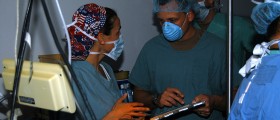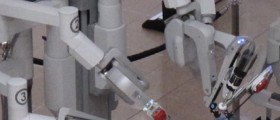
Surgical technicians, also known as surgical technologists, are unlicensed assistive personnel in medical institutions, employed in providing surgical care to patients in a variety of settings. Surgical technicians normally work under the medical supervision of surgeons and other medical experts: certified nurses and anesthesiologists.
Duties of surgical technicians
Their main task is to take care about the safety of the operating room and proper functioning of the surgical equipment. Moreover, surgical technicians are in charge of safe operative procedures by application of sterile and aseptic techniques on the part of the body where the incision will be made. They will also need to remove any hair that is present on the incision site. Prior and after the surgical procedure, surgical technicians will move the patient from one room to another and place them on the surgical table. The surgical technician will also need to use sterile coverings to protect the patient’s body during the surgery. In the course of the surgery, and during the recovery process, surgical technician will check the patient’s vital signs and records and assists the doctors and nurses with their gloves and gowns. Moreover, technician will take an active role during the surgery by handing the tools and supplies to the doctors and surgeon, at their request. When the surgery is over, surgical technician has to count all of the equipment: needles, sponges, and instruments, to verify that no foreign object is left inside of the patient’s body. When everything is complete, surgical technician will reload the room with surgical supplies and carry the patient back in their recovery rooms.
Training for a surgical technician
Training for surgical technologies is offered at community and junior colleges, the military, hospitals, universities and vocational schools. Most of the accredited programs require a minimum of prior education such as a high school diploma or GED for admission. Future surgical technicians will attend courses in anatomy, microbiology, pharmacology, physiology, professional ethics, and medical terminology. They will also have to learn all about sterile techniques, surgical procedures, patient care, and safety. To complete their training, future surgical technicians will have to gain enough practical skills and learn how to sterilize instruments, or handle drugs and equipment.
Employment opportunities for surgical technicians
Surgical technicians are usually employed by hospitals. The job growth for these medical workers is projected to be faster than average, in comparison to other professions. This is a very favorable occupation with a median of $31,210 in earnings, according to the recent statistics from 2002. On average, surgical technicians earn somewhere between $36,740 and $26,000, while the 10% of most paid technicians earns more than $43,470.

















Your thoughts on this
Loading...